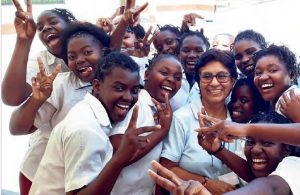More than 6,000 guerrilla fighters have recently traveled by foot, truck, jeep, boat and mule through the thick Colombian jungle towards Puerto Asís, a town deep in the Amazon. A UN deployment is there, ready to collect their arms and fulfill their side of the recent peace deal. After 52 years of bloodshed, they are disarming and reintegrating into society.
“Who would have imagined the Revolutionary Armed Forces of Colombia (FARC), with its rifles, walking to these areas to give them to the UN?” President Juan Manuel Santos asked. “That is something extraordinary that the world is seeing, admiring and applauding”.
Mr. Santos, awarded with the 2016 Nobel Peace Prize, never gave up on securing a peaceful resolution to Latin America’s longest-running civil war, which had cost over 220,000 lives and displaced more than six million people. When a slender majority of Colombians rejected his initial offering, he got back to work and returned six weeks later with “a better agreement”.
The road to peace will not be easy. “Colombian society hates the FARC and if this part of the process is not a success, groups will resurge”, Paula Guisado, a Colombian journalist from Medellín commented. After decades in the jungle, it is unknown how many of the ex-rebels can read or write. Most are expected to remain in poor rural areas. Twenty-two transitional camps, scattered around the country, will be supervised by the UN and government forces. Illiteracy, poverty and distrust are difficult barriers, but there has not been a single killing since the deal, and the country ended 2016 with the lowest number of murders in four decades.
Meanwhile, the public phase of dialogue between the Colombian government and the other guerrilla group ELN (Ejército de Liberación Nacional) has been started in the capital of Ecuador, Quito. The Bishop of the Diocese of Tibu, His Exc. Mgr. Omar Sanchez Cubillos, member of the Colombian Bishops delegation, also participated in the meeting.
At the moment the two sides have completed their proposals, and these also include an explicit request to the Church to be present at the trial that begins now.
It was mainly ELN that requested the participation of the Church. According to Mgr. Omar Sanchez, after a thorough reflection and consultation with the national government, the Bishops considered it appropriate to accept this invitation in order to accompany “a process that is helpful to many people of our territories, in which ELN is present”.
The note recalls that the Bishops of the Diocese of Arauca, Quibdo, Istmina and Cali, will be present as facilitators and to offer their advice when requested. The Colombian Catholic Church has long expressed a desire to close every armed conflict in the country with every guerrilla group.






